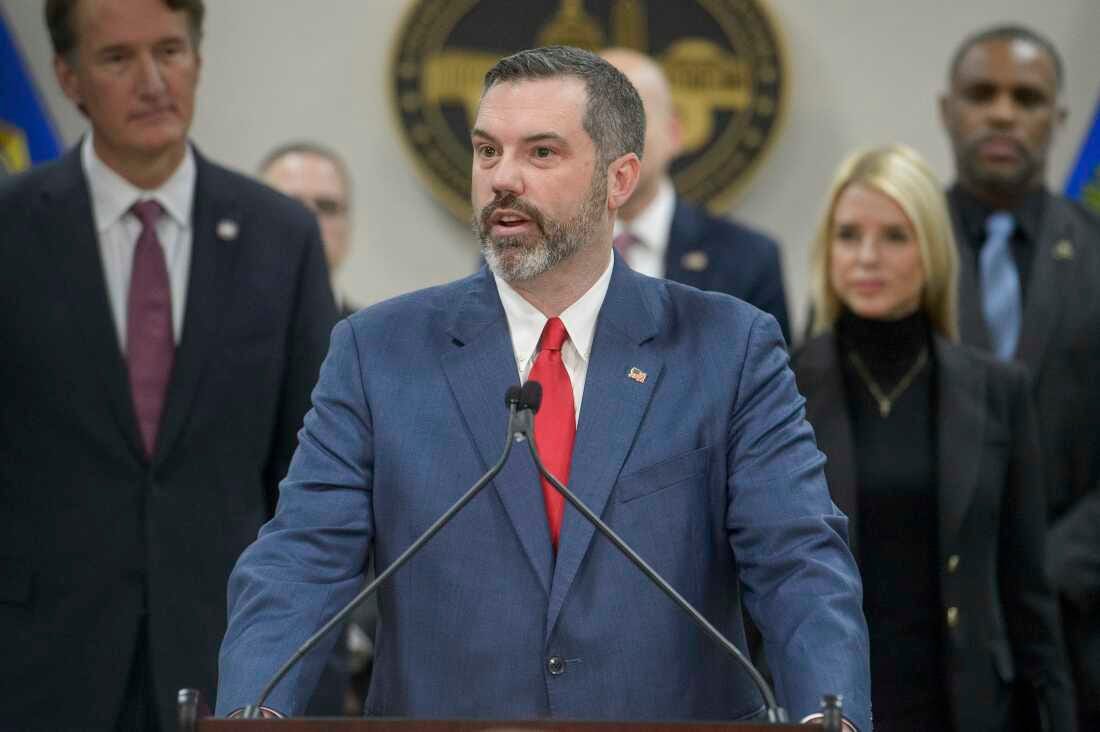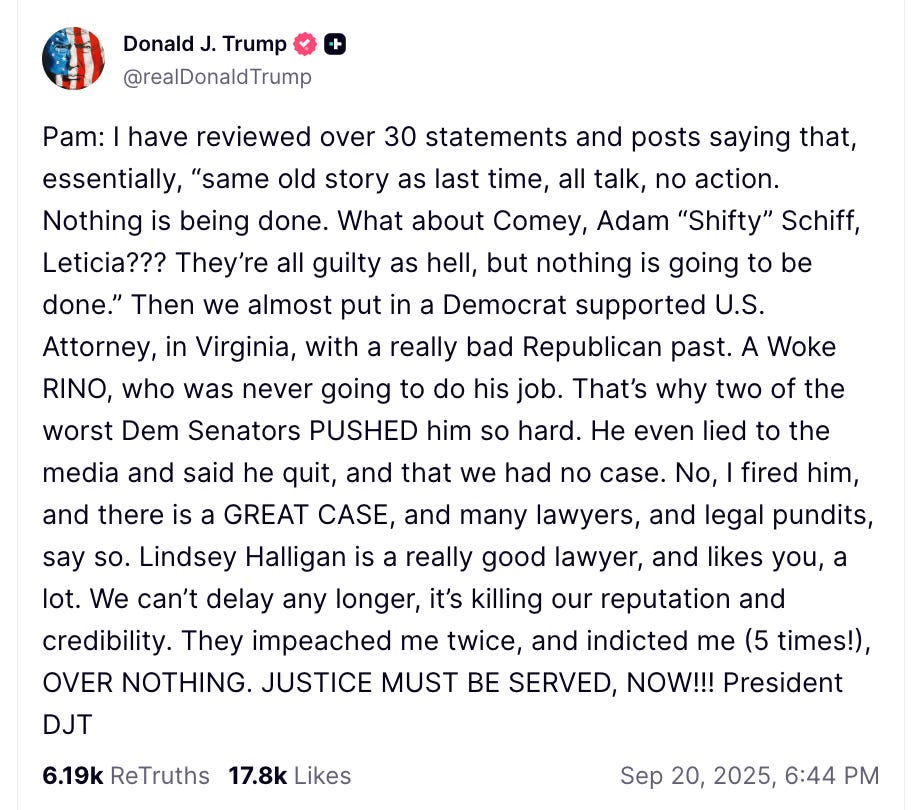With apologies, this is a long post for any night, let alone a Saturday, but Trump’s abuse of the power of the prosecutor and efforts to directly control the work of the Justice Department make it essential. In a world that has become a constant barrage of horribles from this president, know that what I’m writing to you about tonight is exceptionally serious and dangerous.
What does “decline to prosecute” mean? It means that for one of a number of reasons, prosecutors who’ve looked at the case don’t think there is sufficient admissible evidence to obtain and sustain a conviction. That’s the standard the Federal Principles of Prosecution require a case to meet before prosecutors can seek an indictment.
Prosecutors can decline to prosecute for reasons such as key evidence being inadmissible (for instance, because it was obtained in violation of the Fourth Amendment’s prohibition on illegal searches and seizure), because a state prosecutor is in a better position to prosecute, or because evidence of a key element of the crime—frequently the required “mens rea” or state of mind (intent, knowledge, etc.) a defendant must have acted with when they committed it—isn’t there. Sometimes declination happens because no crime was committed. We don’t know what the reason(s) were here, but we do know that a team of investigators and prosecutors in an outstanding U.S. Attorney’s Office looked at the evidence and came up empty-handed. It was about the law and the facts, not politics, regardless of what a president who views everything through the lens of his personal popularity claims.
In investigations like these, agents with the FBI and other law enforcement agencies gather evidence and bring it to prosecutors, who evaluate it to determine what, if any, charges might be available. Sometimes they ask agents to go back and look for specific, additional evidence if there’s a weakness. Federal law creates crimes and sets out specific “elements” of the crime prosecutors must be able to establish, beyond a reasonable doubt, in the minds of jurors in order to convict. If there’s a problem with one or more elements, but serious indications that a crime was committed, the team works together to try to acquire additional evidence.
Typically, there is agreement about whether there’s enough evidence to bring a case or not. But occasionally, agents may think prosecutors have mis-analyzed a case when they decline to indict. When that happens, supervisors frequently get involved to hash out the evidence and determine which side has the correct view. In exceptionally close or potentially high-profile cases, that review may go all the way to the U.S. Attorney, who thinks through the issues with the team before making a final decision. The number of hands that touch a case, and the second, and perhaps a third and a fourth look from supervisors, are designed to reinforce a process that is based on the law and the evidence, not personal bias or politics.
The interim U.S. Attorney in the Eastern District of Virginia, Erik Seibert, was a highly regarded career prosecutor. He was hired in 2010 as an Assistant U.S. Attorney. He spent almost 15 years handling a wide variety of cases related to violent crime, international and domestic drug trafficking, illegal possession and trafficking of firearms, fraud, child sexual exploitation, illegal immigration, and public corruption in the course of his service before Trump appointed him interim U.S. Attorney on January 21, 2025. He received numerous awards for his prosecutions. Siebert was a Metropolitan Police Department officer in Washington, D.C., from 2002 to 2006 before going to law school at the University of Richmond.
Siebert had support from both the Virginia GOP and its two Democratic Senators—no mean feat. It signals that he was a conscientious career prosecutor who understood that the job was not about politics. The Judges in his district weighed in in his favor too. In May, when his 120-day term as the interim expired, the court unanimously appointed him to continue in the role (as opposed to the court in New Jersey, which selected a replacement for Trump nominee Alina Habba when her term as interim ran out).
That background is important. This is a prosecutor who was well qualified to oversee a decision in a case like this. When advised that there wasn’t a case, he had the experience and judgment to make an independent assessment of whether his team was correct. This is how justice is supposed to work. Not all investigations mature into prosecutions. Prosecutors do their jobs not only when they indict, but when they decline to bring faulty cases as well.
Even before Siebert resigned under fire from Trump, there was reporting that “sources familiar with the matter” said that the administration had plans to “install a U.S. attorney who would more aggressively investigate James.”
Saturday afternoon, the Washington Post reported it would be Mary “Maggie” Cleary. Cleary graduated from the University of Virginia School of Law (my alma mater as well), in 2017. She took a position as an Assistant Commonwealth’s attorney in Culpepper, Virginia, working there until January of 2021, when she went to work in the U.S. Attorney’s Office for the Western District of Virginia (a much smaller office than the Eastern District that she now helms). She stayed there for just over a year, leaving to take a position as the Deputy Secretary of Public Safety and Homeland Security. She stayed there for two years before moving over to serve as counselor to Virginia’s Attorney General for a year. She briefly returned to the Culpepper Commonwealth Attorney’s office before going to the Justice Department’s Criminal Division in September of 2025. I’ve dragged you through her entire LinkedIn bio to make the point that her federal experience is extremely thin. This is the kind of resume that might get you a job as a line prosecutor at DOJ, but not typically the nod to be U.S. Attorney—especially not in one of the country’s biggest and most important offices. In Cleary’s favor, she has spent at least some time as a prosecutor. Her LinkedIn also says that she “served in the Culpeper County Republican Committee, and has taught civics to aspiring US citizens. Cleary serves as an adjunct professor at UVA Law, teaching Advanced Trial Evidence.”
But the problem is, the job is compromised. Compromised by the president’s political meddling in prosecutions. The prosecutor who gets the job, will have to “reconsider” serious cases, like the ones Siebert apparently passed on, but without his wealth of experience to rely upon. She would take the job knowing her assigned task is to be a rubber stamp. It’s an unenviable position to be in, and hard to understand why any lawyer would willingly take it on, knowing the expectations.
After the Post’s report on Siebert’s successor, Trump muddied the waters with a post on Truth Social, insisting that his judgment that “They’re all guilty as hell” supplant prosecutors’ assessment of cases. In addition to publicly posting a missive to “Pam,” his Attorney General, directing her to prosecute cases against people he has identified as his enemies, he suggested a different nominee for the Eastern District of Virginia, Lindsay Halligan, who he emphasized “likes you” (not a qualification to be U.S. Attorney any more than personal loyalty to the president is.)
Lindsey Halligan is currently a “Special Assistant to the President,” where she has worked on the information purge at the Smithsonian. Before this, she practiced insurance law in Florida, becoming a member of his legal team and handling her first federal case in 2022 when Mar-a-Lago was searched. She has no apparent ties to the Eastern District of Virginia and does not appear to be a member of the Virginia Bar. She has never handled any kind of prosecution. Unlike Cleary, who was qualified for a U.S. Attorney’s position, Halligan’s resume wouldn’t get her an interview, let alone a job as an assistant, let alone as the United States Attorney.
If you’ve been paying attention, it’s not exactly news that this is Donald Trump’s revenge presidency. It’s not even news that Donald Trump is trying to use the criminal justice system to harm people he considers to be his enemies. Investigations launched against Letitia James, Adam Schiff, Jim Comey, and others fully substantiate that, despite the under oath promises by Bondi and FBI Director Kash Patel that there would be no enemy lists when they stood for confirmation.
But now it’s clear that there are. And Trump will install a U.S. Attorney in Virginia who will guarantee that. If she deviates from the plan because she is principled, she, too, will likely be replaced with someone more compliant. Perhaps the administration will want to let go of this messy situation, let a lengthy re-investigation forestall additional controversy, rather than seek a bad indictment and have a grand jury reject it, or get a marginal indictment and face dismissal from a judge or a failure to convict by a trial jury. But Trump seems extremely focused on getting revenge.
It feels like it should be unnecessary to state the obvious here, that there’s not much of a case if the only way to get it prosecuted is by firing an experienced prosecutor to get an inexperienced one (or no prosecutor at all) to bring it. So let’s be clear about what Trump wants. He wants to turn us into a banana republic where the ability to prosecute people becomes a political tool in the hands of the president. That means he wants to exercise the ultimate power to put down any opposition to his rule.
It’s precisely what I’ve been discussing with you on television and in writing since the start of Trump’s first administration. It has always been a risk, now it’s on the edge of becoming a reality. Any president who would behave this way is a president in name only; in truth, they are well down the road to becoming a dictator. This is a moment as serious, if not more, as the one the country faced during Watergate.
“Show me the man and I’ll find the crime.” That comment is attributed to Lavrentiy Beria, Stalin’s head of the Soviet secret police. It signifies that regardless of guilt or innocence, political enemies of the state can be targeted to quell opposition. Justice is not the goal. Adam Schiff and Letitia James understand that message, but they continue to choose to defy it. We need to all stand with them in the days and weeks ahead. Protecting the First Amendment and the integrity of the criminal justice system against abuse by the president may we be the two most important challenges we will take on between now and the midterm elections.
Thank you for sticking it out with this long post. In the category of “truth is stranger than fiction,” here’s one last bit of information about Maggie Cleary, one of the possible nominees for the U.S. Attorney spot in the Eastern District. In a piece Cleary wrote in May, she claims she was once falsely accused of being present at the Capitol on January 6. She wrote it to claim she was briefly investigated based on anonymous, and she implies, politically motivated, sources. She concluded, “In the last four years, I’ve been somewhat cautious about sharing my experience, but now, while Donald Trump is president, I feel emboldened to finally tell how I, too, was targeted politically. I want to be US Attorney for the Western District of Virginia to end this type of treatment. President Trump needs attorneys in these roles who understand how to identify this behavior and end it during this administration.”
What we need are qualified, competent, career folks who will do the job they swear an oath to do and deliver impartial justice to the American people, regardless of the president who appoints them.
We’re in this together,
By Joyce Vance


